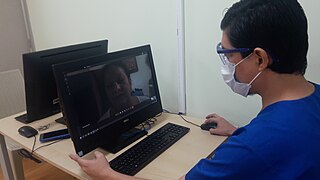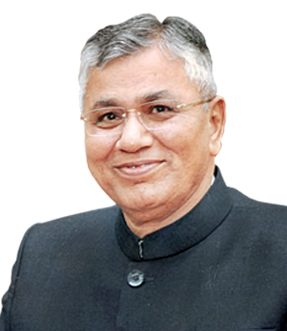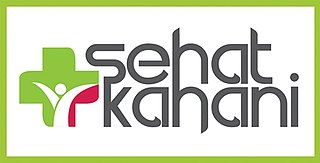Related Research Articles

Ravi Shankar is an Indian yoga guru, a spiritual leader. He is referred to as Sri Sri (honorific), Guru ji, or Gurudev. From around the mid 1970s, he worked as an apprentice under Maharishi Mahesh Yogi, the founder of Transcendental Meditation. In 1981, he founded the Art of Living foundation.

Telehealth is the distribution of health-related services and information via electronic information and telecommunication technologies. It allows long-distance patient and clinician contact, care, advice, reminders, education, intervention, monitoring, and remote admissions. Telemedicine is sometimes used as a synonym, or is used in a more limited sense to describe remote clinical services, such as diagnosis and monitoring. When rural settings, lack of transport, a lack of mobility, conditions due to outbreaks, epidemics or pandemics, decreased funding, or a lack of staff restrict access to care, telehealth may bridge the gap as well as provide distance-learning; meetings, supervision, and presentations between practitioners; online information and health data management and healthcare system integration. Telehealth could include two clinicians discussing a case over video conference; a robotic surgery occurring through remote access; physical therapy done via digital monitoring instruments, live feed and application combinations; tests being forwarded between facilities for interpretation by a higher specialist; home monitoring through continuous sending of patient health data; client to practitioner online conference; or even videophone interpretation during a consult.

The Art of Living Foundation is a volunteer-based, humanitarian and educational non-governmental organization (NGO). It was founded in 1981 by Ravi Shankar. The Art of Living Foundation has centers in 180 countries.

Apollo Hospitals Enterprise Limited is an Indian multinational healthcare group headquartered in Chennai. It is the largest for-profit private hospital network in India, with a network of 71 owned and managed hospitals. Along with the eponymous hospital chain, the company also operates pharmacies, primary care and diagnostic centres, telehealth clinics, and digital healthcare services among others through its subsidiaries.

Ravi Shankar Prasad is an Indian politician and lawyer, from the Bharatiya Janata Party. A Member of Parliament since 2000, first in the Rajya Sabha (2000–2019) and then in the Lok Sabha, Prasad has served as Union Minister multiple times: As Minister of State, he served in the ministries of Coal (2001–2003), Law and Justice (2002–2003), and Information and Broadcasting (2003–2004) under Atal Bihari Vajpayee's premiership; as Cabinet Minister, he held the Law and Justice, Communications, and Electronics and Information Technology (2014–2021) portfolios under Narendra Modi's premiership.

Fortis Healthcare Limited (FHL) is an Indian for-profit private hospital network headquartered in Gurgaon, India. Fortis started its health care operations in Mohali, Punjab, where the first Fortis hospital was started. Later on, the hospital chain purchased the healthcare branch of Escorts group and increased its strength in various parts of the country. The Escorts Heart and Research Center, Okhla, Delhi became a major operating unit of the chain. Dr. Tehran, the current MD of Medanta and several others have started their careers at this institute.

The L V Prasad Eye Institute (LVPEI) is an eye-care network, established by Dr. Gullapalli Nageswara Rao, an ophthalmologist, at Hyderabad, in 1986. It is a non-profit, multi-campus, non-governmental institution. With more than 275 eye-care centres in India, it is the largest eye-care network in the world.

Common Service Centres (CSC) are physical facilities for delivering Government of India e-Services to rural and remote locations where availability of computers and Internet was negligible or mostly absent. They are multiple-services-single-point model for providing facilities for multiple transactions at a single geographical location.
The Pan-African e-Network project is an information and communications technology (ICT) project between India and the African Union that seeks to connect the 55 member states of the Union through a satellite and fibre-optic network to India and to each other to enable access to and sharing of expertise between India and African states in the areas of tele-education, telemedicine, Voice over IP, infotainment, resource mapping, meteorological services, e-governance and e-commerce services. The project is often described as Africa's biggest ever in the ICT sector and is expected to extend ICT infrastructure to rural and previously underserved areas. The project is seen as an example of India furthering its economic and strategic interests in Africa through the use of soft diplomacy and has been acclaimed as an instance of South–South cooperation, helping to overcome the digital divide in Africa.

India has a multi-payer universal health care model that is paid for by a combination of public and government regulated private health insurances along with the element of almost entirely tax-funded public hospitals. The public hospital system is essentially free for all Indian residents except for small, often symbolic co-payments in some services.

Pervez Khattak administration was the coalition of provincial government of Khyber Pakhtunkhwa between Pakistan Tehreek-e-Insaf (PTI), the Islamist Jamaat-e-Islami (JI), Qaumi Watan Party (QWP), and Awami Jamhuri Ittehad Pakistan (AJIP). AJIP later merged itself with PTI.
Piramal Foundation is the philanthropic arm of Piramal Group. The foundation undertakes projects under the four broad areas – healthcare, education, livelihood creation and youth empowerment. These projects are rolled out in partnership with various communities, corporate citizens, NGO’s and government bodies.

Digital India is a campaign launched by the Government of India to make its services available to citizens electronically via improved online infrastructure and by increasing Internet connectivity. The initiative includes plans to connect rural areas with high-speed internet networks. It consists of three core components: the development of secure and stable digital infrastructure, delivering government services digitally, and universal digital literacy.

Harsh Kumar is ophthalmologist, who is reported to have described nine laser surgical procedures for glaucoma and anterior segment of which one procedure is cited by Shields Text Book of Glaucoma, a known reference book on glaucoma management. He is the director of Glaucoma Services at Centre for Sight, New Delhi and also serves at the Indraprastha Apollo Hospitals, Delhi. He was honoured by the Government of India in 2015 with Padma Shri, the fourth highest Indian civilian award.

All India Institute of Medical Sciences Bhubaneswar, formerly Netaji Subhas Chandra Bose All India Institute of Medical Sciences, is a medical college and medical research public university located in Bhubaneswar, Odisha, India. The institute operates autonomously under the aegis of the Ministry of Health and Family Welfare. It was established in 2014 and the foundation stone was laid by late Bharat Ratna; Atal Bihari Vajpayee, on 15 July 2003.

P. P. Chaudhary is a Senior Advocate and an Indian politician. He is a member of the Bharatiya Janata Party (BJP) and represents Pali Lok Sabha constituency (Rajasthan) in the 17th Lok Sabha. Currently Chaudhary is Chairperson of the Parliamentary Standing Committee on External Affairs. He has previously served as Chairperson of The Joint Committee on the Jan Vishwas Bill 2022, The Joint Committee on Personal Data Protection Bill, 2019 & Joint Committee on Offices of Profit. He is also a member of the Estimates Committee, Business Advisory Committee, General Purposes Committee of Lok Sabha and Consultative Committee of Ministry of Home Affairs, Govt. of India.
Biju Swasthya Kalyan Yojana is a universal health coverage scheme launched by Chief Minister of Odisha, Naveen Patnaik. The program extends coverage to approximately 70 lakh families, with the state government allocating a budget of 250 crore rupees. Services:
- Free health services are available in all state government health care facilities, starting from the subcenter level up to the district headquarter hospital level, with Swasthya Mitras deployed at help desk.
- Annual health coverage of Rs 5 lakhs per family and 7 lakhs per female members of the family.
The tele-law programme is a legal program by the Indian government launched in 2017 via the Common Service Centres. The programme connects the disadvantaged people in India requiring legal advice from panel lawyers through an e-interface platform.

Sehat Kahani is a Pakistan-based telemedicine company.
References
- ↑ "Govt launches Sehat telemedicine initiative". Live Mint. Retrieved 28 August 2015.
- ↑ "Ravi Shankar Prasad launches govt's SEHAT initiative". India Blooms. Retrieved 28 August 2015.
- ↑ Praveen, KB; Ali, SS (2013). "Telemedicine in Primary Health Care: The Road Ahead". Int J Prev Med. 4 (3): 377–8. PMC 3634179 . PMID 23626897.
- ↑ "Government launches telemedicine initiative 'Sehat'". The Times of India. The Economic Times. Retrieved 28 August 2015.
- ↑ "Ravi Shankar Prasad launches government's new health initiative 'SEHAT'". Financial Express. The Indian Express. Retrieved 28 August 2015.